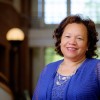This article is more than 5 years old.
This week I’m in Seattle attending a Library Assessment Conference entitled “Building Effective Sustainable, Practical Assessment.” Of the 375 Librarians in attendance, some 15 % are from outside the United States. The day began with keynoters Susan Gibbons, University of Rochester; Rick Luce, Emory University and Betsy Wilson, University of Washington discussing what they perceived as the most important challenges for Library assessment. Gibbons began by reminding Librarians of their love to count and how they count everything. But what do these numbers teach us? Her library’s reference queries have dropped by 10,000 during the past decade. Does this mean they are failing? No. Everything has changed about user needs and demands. Their assessment plan included handing out disposable cameras and asking students to take pictures of their favorite places on campus, favorites within the library, study patterns, favorite times of the day and what items are essential to your daily activities? Among their many findings they concluded that all students have cell phones and they don‘t leave home without them. From a web page study that involved printing the page and presenting the copy to focus groups, they discovered among other things, missing contact numbers. Ironically though Rochester joined some 41 % of all ARL libraries failing to list their contact numbers on their web pages. Gibbons also stressed the importance of knowing the uniqueness of your community, timing is everything, when’s the point of need, accessing, looking, connecting, reallocating and refocusing.
Rick Luce was a good speaker with interesting slides which he was careful to remove before I could write down complete statements. He viewed assessment as the catalyst for organizational change. Statements without performance measures are nothing more than wishful thinking. What’s the framework for greatness? Do something others can’t; do something well others do poorly; or do something others have great difficulty doing well. Keys to successful assessment should include a strong customer focus, effective leadership, continuous improvement and management by fact. Luce advised against the following pitfalls; measures that don’t focus on strategic initiatives, no accountability, too many initiatives and lack of discipline. It’s a struggle and it’s sometimes very painful but libraries should strive for an honest self assessment.
Betsy Wilson cited the number one challenge for Librarians is to accelerate the relevance. We can’t live without assessment. It is the lifeblood to any successful organization. She encouraged attendees to turn a “culture of complaints” into a “culture of assessment.” If we stay ahead of the assessment game, we have more chances of controlling the future agenda. But to do this effectively, we need frameworks and models which reflect our values and our aspirations. We have to tell our stories. We have to be intimate with our users and engaged with our communities.
This conference groups two to three presentations together in one room for an hour and a half time slot. It works out ok, however you begin to feel that sessions are rushed and sometimes a lack of sufficient timing for questions and answers remains. Our colleagues over at UNC-G were squeezed in between a LibQUAL presentation from the folks at Radford University and the University of Chicago’s review of “wayfinding efforts.” UNCG presenters Kathy Crowe and Michael Crumpton sported name changes as Associate Dean and Assistant Dean respectively. Their presentation was entitled “Using Evidence for Space Planning.” The three year study they conducted included an in house survey, observational studies and focus groups. A space consultant was also used in the assessment process. Many of their resulting upgrades from the studies mirrored changes that we here at ZSR have also implemented. They repurposed spaces, implemented quiet study zones, reduced the size of reference collections, expanded their information commons area, went to 24/5 hours of operation, began allowing food and drink in the library, brought in more comfy furniture and have began weeding the government documents collection.
Roger Schonfeld of Ithaka is tasked with studying how new technologies affect academia and how those changes they bring can best be managed. For the Assessment conference he reviewed, “Strategy and Leadership in the Transitions Away From Print.” Schonfeld visited 14 American academic libraries for 1 -3 days each, meeting with Library directors, staff, faculty, students and campus leadership. Findings from these visits seem to indicate that budgetary limitations and space management considerations play a major role in format migration. While most libraries see the digital future as beckoning they have not allowed for effective community wide strategic planning. Smaller libraries are relying on larger libraries to preserve or keep the print. Larger libraries are not seeing this as their role and are not doing so. Schonfeld warned that librarians should remember the lessons learned when transitioning from newsprint to microform. Are we Librarians preserving the intellectual content for those around in the year 2050?
More later, Wanda.

1 Comment on ‘Library Assessment Conference’
Thanks for the nice blog entry. Just a clarification: our reference queries dropped by 10K in a decade (1996-2006), not per year.